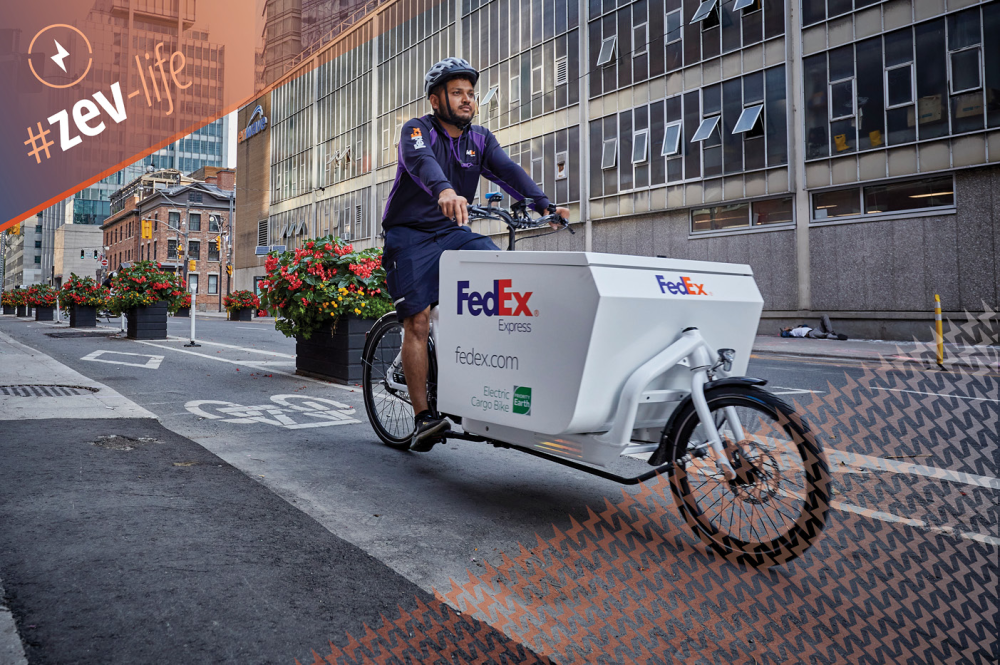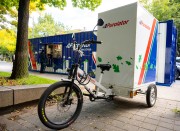“It was a no-brainer,” recalls Jeff Gilbert, FedEx Express Canada senior manager of operations-Metro division. Gilbert was describing his initial response to the idea of piloting a cargo e-bike program in downtown Toronto based on feedback from his team after they attended an Urban Freight conference hosted by the Pembina Institute early in 2020.
Several e-bike models were on display at the conference and, after speaking with the company representatives and researching some of the options available, the rest is history.
Gilbert and his team were inspired by the idea of using e-bikes for last-mile deliveries in the busy Toronto core. By the end of July of the same year, FedEx-branded bikes were navigating the city’s congested streets, delivering parcels that had been packed in the cargo boxes (315 litre carrying capacity) of the three bikes.
Much thought had gone into the choice of bicycle. After a thorough assessment of the cargo e-bike marketplace, FedEx went with the Bullitt, manufactured by Larry vs Harry in Denmark, for the pilot. Light and agile, the bike has three settings, the lowest being “eco” which allows the rider to pedal up to 150 km before needing to re-charge.
Within three to four months, the bikes outperformed early expectations with respect to service in the volume of deliveries – couriers were covering 25 to 26 kilometres a day along high-density routes.
It wasn’t long before word got out and FedEx locations around the world started contacting the Toronto team for updates on the how the e-bikes were performing in Canada’s largest city. The head office in the U.S. paid close attention to the e-cargo bike fleet’s performance. FedEx offices in Mexico, India, London and, not surprisingly, Amsterdam all reached out for more information from the Toronto team. Everyone wanted to learn how to get onboard for the ride.
“When the program launched,” laughs senior communications specialist Stephen Anderson, “the riders were like rock stars. People would wave to them and cheer. They still do.”
Stop and start
Less than six months after launching, FedEx decided to expand the program, grow its e-cargo bike fleet, and hire more bike couriers, all in the midst of the pandemic.
As was the case for many delivery services, the lock-down brought both opportunities and challenges. E-commerce skyrocketed. But so did bike sales. Sourcing additional bikes was a bigger headache than originally anticipated as was hiring staff to ride them. Plans for growing the program stalled.
Even so, there was a silver lining to the bike scarcity. While the surge in popularity made it more difficult to buy a bike, the ballooning number of cyclists also encouraged the city to loosen restrictions on permissible bike sizes and to improve bike lanes.
By August 2021, the FedEx team had managed to add 40 more bikes to the fleet and launch e-bike delivery programs in Montreal, Ottawa, Mississauga, Calgary, Vancouver and Victoria. Many of the bikes are stored in “micro-hubs” – there are two in Toronto – where they are loaded with packages before hitting the streets, returning to the hub for more cargo and to re-charge.
Even the hubs are evolving. FedEx recently announced that they will operate some e-bikes out of a new shared micro-hub in Montreal.
Canadians don’t mind the cold
But wait. What about deliveries during the long winter months and the season’s decidedly un-bike-friendly conditions? “Not a problem,” Gilbert says. As evidence, he points out that Calgary was the first Canadian city to join Toronto in offering cargo e-bike service, in 2021.
“We used to say, ‘there’s going to be six inches of snow, pull the bikes,’” Gilbert adds. “But the couriers got mad at us. They said it was fine. So now we leave it up to them to decide whether to ride or not.”
It turns out that weather is a deterrent only under rare circumstances, which bodes well for FedEx to continue expanding in Canada, adding to the locations dotted across the country providing cargo e-bike deliveries.
Vision quest
“I’d like to see e-cargo bike fleets grow globally,” says Gilbert. Indeed, as one of its sustainability goals, FedEx has set 2040 as the company goal for its entire fleet of pickup and delivery vehicles to be electrified.
Gilbert says that bikes can be helpful wherever they encounter difficulty using a vehicle due to parking constraints, congestion and the like.
It all adds up
Since the first Larry vs Harry cargo e-bike pedalled into the heart of Toronto on a hot day in July 2020, the FedEx e-bikes in Canada have made more than 130,000 stops, delivered more than 145,000 packages, travelled more than 50,000 kms, and averted more than 14 tonnes of carbon emissions.
Electrifying delivery service
For the past six years, the Pembina Institute has been actively engaged in promoting regulations that support and encourage cargo e-bikes for personal use and urban deliveries in the City of Toronto and province-wide.
Cargo e-bikes for last-mile deliveries are expected to play a large role in the movement of goods in the densest and most congested urban centres. Provincial and municipal governments will need to accommodate this increasingly popular mode of transportation by making sure that regulations and infrastructure are designed for the safe use and integration of cargo bikes with other road users.
Currently, the Pembina Institute is working with the City of Toronto, Purolator, FedEx Express, and DHL on a monitoring pilot project scheduled to launch in spring of this year, thanks to City Council recently approving to opt-in to the provincial pilot permitting the expanded use of bigger e-cargo bikes. This summer, all three delivery services will be operating cargo e-bikes in the city’s downtown core, displacing fossil-fueled delivery trucks.
With input from the Pembina Institute, the use of the e-cargo bikes delivery system will be monitored and assessed at regular intervals, noting any challenges that come up, such as how far a bike can travel on a single charge, as well as the many benefits of using the bikes including the amount of greenhouse gas emissions avoided.
How long the program runs is an open question. In all likelihood, cargo e-bike numbers will continue to increase well into the future, eventually becoming a regular part of Canada’s urban delivery systems.
Read more about the Pembina Institute’s research and recommendations on cargo e-bikes and last-mile delivery solutions:
- Regulatory clarity helps Toronto promote the use of cargo e-bikes
- Creating regulations that allow for greater use of e-bikes and cargo e-bikes
- Cyclelogistics: Opportunities for moving goods by bicycle in Toronto
- Modernizing Urban Freight Deliveries
- Delivering last-mile solutions
- Cargo e-bikes for urban deliveries





